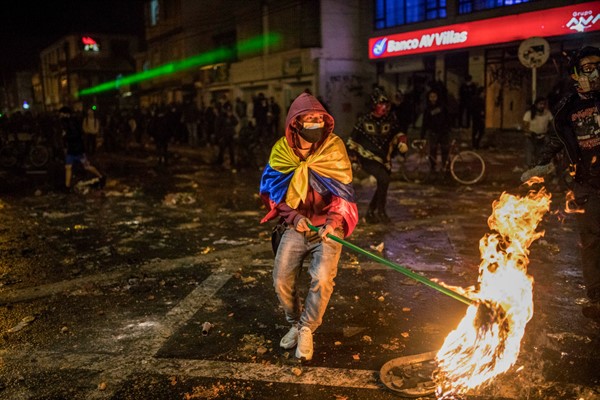Security forces killed 13 people during two days of violent protests against police brutality last week in Colombia’s capital, Bogota. Sixty-six civilians and nearly 200 police officers were wounded. More than 200 buses were vandalized, and 54 small police posts were destroyed. If those numbers described a battle during the country’s 50-year internal armed conflict with guerrilla groups, it would have been one of the bloodier ones. It was a jarring sight to behold in “post-conflict” Colombia, four years after the country’s largest guerrilla group, the Revolutionary Armed Forces of Colombia, better known as the FARC, signed a peace accord with the government.
The spark for the unrest recalls the killing of George Floyd in Minneapolis. On Sept. 8, a video circulated online, taken with a mobile phone, showing police officers repeatedly using a stun gun on a man they had already pinned to the ground, while he begged them to stop. The man, Javier Ordonez, a lawyer in his mid-40s with two children, was not suspected of committing a crime, but had been drinking that night with friends and had apparently exchanged insults with the officers. According to local media reports, he was later driven to a police station and beaten; he died in a hospital hours later, from nine fractures to his skull.
The Ordonez video proved to be a match thrown onto very dry tinder, especially in the neighborhoods that house Bogota’s lower and working classes. The city has been haltingly reopening after enduring six months of one of the strictest COVID-19 lockdowns in the Western Hemisphere. The restrictions contributed to a 15 percent year-over-year contraction in Colombia’s GDP during the second quarter of the year. Hundreds of thousands of Bogotanos have been thrown out of work and many informal workers have seen their livelihoods decimated, including over 300,000 Venezuelan migrants. For most, emergency assistance from the government has totaled only about $40 to $70. The anxiety and stress, along with the mental health effects of long isolation, have been incalculable.

